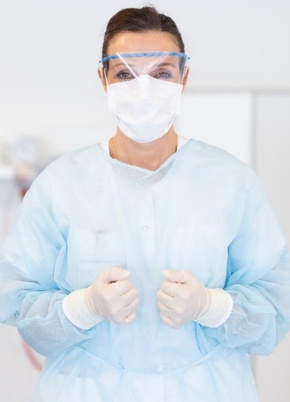Patient isolation at the hospital
If you need to be in isolation while you are at the hospital, the reason is that you are suffering from or are kept under surveillance for an infectious disease, or that you have been found to be a carrier of resistant microorganisms. Isolation does not as such indicate that you are seriously ill.
The duration of isolation varies from case to case and depends on what has made it necessary to resort to isolation. The period of isolation will end as soon as it is found medically appropriate.
What are the practical consequences of having to be in isolation?
You will be given a single room, or you may share a ward with other patients in a similar situation.
- As a rule, the door to your room will be closed.
- You may only use toilet and bath facilities that have been assigned to you by staff.
- Be careful with hygiene. A staff member will show you how to wash and sanitize your hands.
- If you need to go to another department for tests or examinations, you will be given new clothes and fresh linen immediately before you go there.
- Staff will bring food, drink, towels and other things you need to your room.
- If you arrange it with a staff member, you may go outside for a walk.
- If physical training is part of your treatment, it is possible to leave your room accompanied by a staff member.
- Single-room isolation is only required while you are in hospital, not when you are in your home.
Isolation will not have any influence on the investigation of your condition or your treatment.
Is it possible to have visitors while you are in isolation?
Family and friends are welcome to visit you in hospital. In case they want to visit other patients too, they must do so before seeing you.
Your visitors:
- must talk to a staff member before they enter your room in order to be given instructions about precautions while visiting you.
- must be in your room for the whole duration of the visit. They are not allowed to spend time in common areas in the ward.
- are required to sanitize their hands both when they enter your room and when they leave it.
- will only be asked to wear gloves, face masks and protective gowns if staff find it necessary.
Precautions taken by staff
To prevent spreading disease, members of staff will be wearing protective gowns and gloves while doing their job in your ward in some situations. They may also be wearing face masks, glasses, and visors.
If members of staff do not get close to you, they do not always need to take these precautions. This applies when they talk to you, serve food, deliver medicine etc.
| Staff member wearing protection |



